Phone apps and online phone books use reverse look ups to help you find the name and address of a person attached to a phone number. The phone number can be a landline or a cell phone number, although the latter is harder to search.
Reasons to Search
You might use a reverse phone search for several reasons:
The Caller ID on your phone shows several calls from Suzy Smith at 814-991-0451. Who is she, and where is the 814 area code from?
You see phone numbers on your bill that you don’t recognize. Did you make the calls or was it a mistake?
You find a sticky note on your desk with a phone number written on it. You have four choices: throw it away, save it until you remember, call and hope you recognize the voice, or use a reverse search. The latter is the easiest and probably the least embarrassing on the list.
You have a missed call from an unfamiliar number. Should you call the number back or ignore it as if it was a wrong number or telemarketer?
Your boss tells you to pick up a package at a local business, but you only have the phone number. You can use an iPhone app to find the owner of a phone number as well as the address.
How It Works
Reverse phone look up is easy to use. You can go online to a search engine and put the number, including the area code and country code, if applicable, in to the search box. The search engine uses its database to provide the user with many sites that say they know the owner and location of the number. You can also type “reverse look up” into a search engine box to find the top websites to run a search on. They should state if the search is free or if it requires a membership or fee. Sites offering cell phone or unlisted number information usually charge a fee.
Using dedicated websites is a more efficient way to search and will give better results. You can use the WhitePages.com database, which tracks about 80% of U.S. phone numbers. It also stores international phone numbers. In addition, you can use a phone app to search a number. Because they are widely used, phone apps tend to be updated the most.
Landline phone numbers give the best results. Before the Internet became popular, phone companies published phone books and reverse phone number directories for each town. The directories were available to police and other officials as well as libraries for public use.
Why It Isn’t Always Free
Websites must pay to maintain their databases. They also collect information from many sources such as phone books, websites, social media, and other directories. Cell phone numbers are difficult to get because there isn’t a phone directory for mobile phones. Even if there were a directory for cell phones, people change numbers so often that it would be almost impossible to keep the information up to date.

